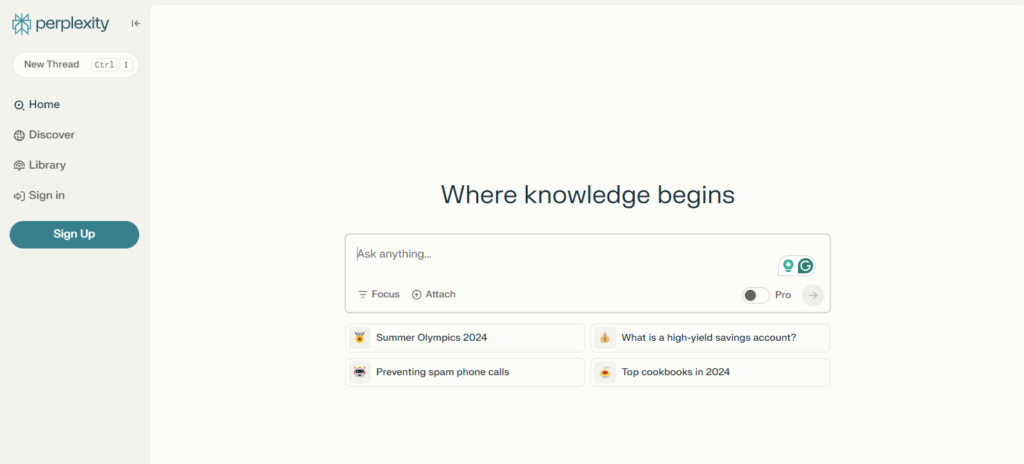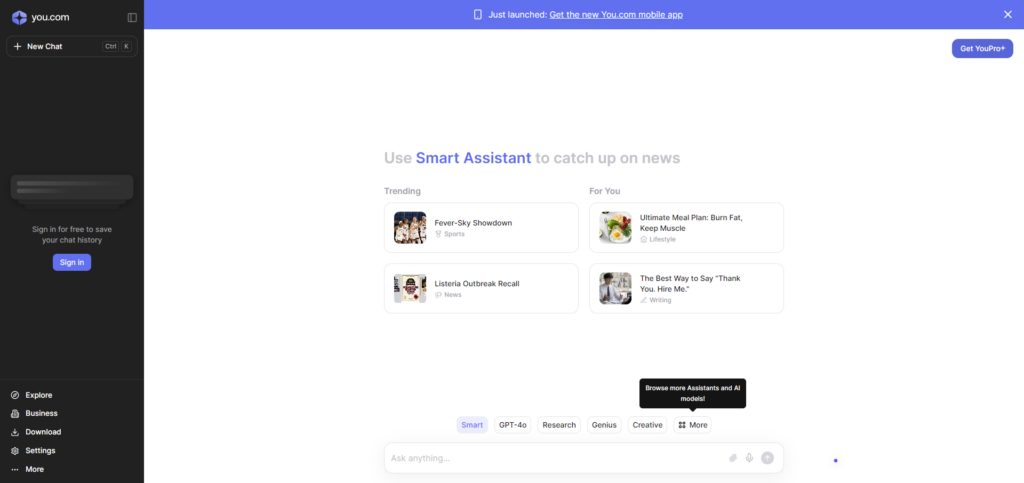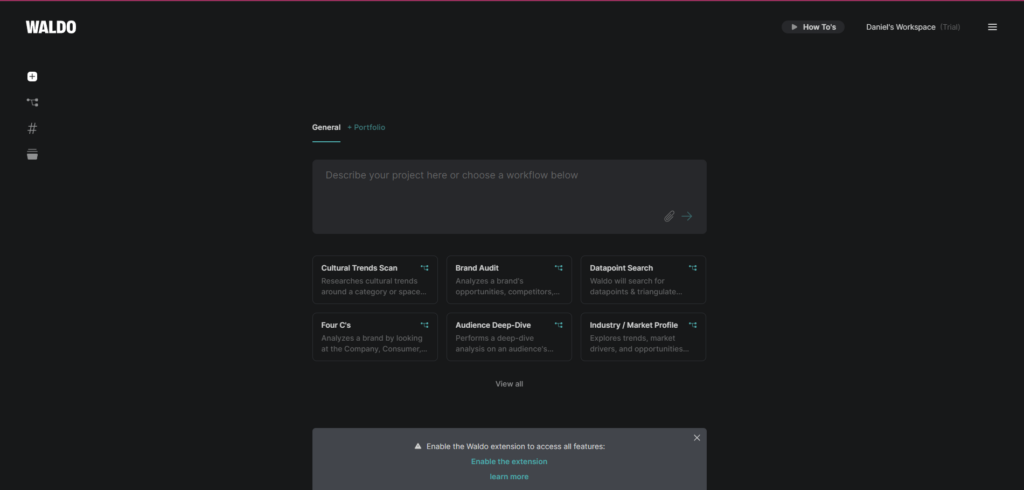Remember late 2022? Large language models like ChatGPT wowed us, but their real-time info access was limited. No, we can just ask an AI search engine like Google and Bing for curated answers, instead of scrolling through search results pages.
In 2024. AI and search have merged, creating a powerful new breed of search engines. These go beyond finding webpages – they provide real-time, conversational answers based on up-to-date info from the web. This fusion is fundamentally changing how we search and consume information online.
Stay tuned as we explore the key players, the impact on information retrieval, and the future of user behavior and online knowledge of the AI search engine for research!
Table of Contents
What is an AI search engine?
AI search engines are transforming how we find information online. Unlike traditional search engines that rely on simple keyword matching, An AI search engine leverages artificial intelligence (AI) to deliver a more insightful experience.
AI’s Advantage:
- Understanding Your Intent: AI goes beyond keywords, analyzing context and natural language to grasp what you’re truly looking for.
- Personalized Results: The engine tailors your search based on past behavior and preferences, making results more relevant.
- Rich Content Experience: Expect multimedia elements like images and links to enhance your understanding.
- Real-Time Answers: AI taps into constantly updated information, ensuring access to the latest news and discoveries.
- Beyond Web Search: AI search technology is used in various applications, from enterprise search to e-commerce recommendations.
How Do AI Search Engines Work?
An AI search engine utilizes artificial intelligence (AI), specifically methods like natural language processing (NLP) and machine learning (ML), to enhance the search experience. Here’s how they operate:
- Crawling and Indexing: AI search engines start by gathering information from across the web. Text, images, and links are stockpiled in a massive index, ready to be retrieved when you have a question.
- Understanding User Intent: These engines go beyond keywords, using natural language processing to grasp the true meaning behind your query, even factoring in context and your search history.
- Assigning Relevancy Scores: Each piece of information is assigned a relevancy score based on how well it aligns with your question. This ensures the most relevant answers rise to the top.
- Generating Concise Summaries: Forget endless blue links! AI search engines present clear summaries directly within the platform, drawing from various sources and presenting the answer in an easy-to-understand way.
- Real-Time Access to the Internet: Unlike chatbots, AI search engines are constantly plugged into the web, providing up-to-date information. Imagine getting clear summaries alongside links for further exploration, just like Google’s AI Overviews!
While AI search engines offer amazing potential, challenges like bias and privacy remain. As technology evolves, we can expect even more exciting advancements in how we find information online.
Top 10 Most Effective Free AI Search Engines
Explore the top 10 best AI search engine list of 2024! These innovative tools transform how you search the web. Find your favorite and see how AI revolutionizes information discovery!
Perplexity AI

According to the latest data, Perplexity AI has approximately 10 million active monthly users. During the course of 2023, the AI startup served more than 500 million search queries. Perplexity currently racks up over 50 million visits per month.
| Pros: | Cons: |
|
Built for AI Search: Unmatched experience combining chatbot-like prompts with search functionality. Smarter Answers: Context-aware and up-to-date responses in clear language. Rich Results: Get images, footnotes, and links for a deeper dive. |
Paid Option: Free version exists, but a paid subscription unlocks full features. No Familiar Search: Operates as its own engine, requiring a shift from usual search habits. |
This is the Best free AI search engine in 2024. Perplexity AI offers a unique and powerful search experience. Its AI-powered approach and insightful answers make it a standout choice, but the lack of a traditional search interface and potential subscription cost might take some getting used to.
Microsoft Copilot (formerly Bing Chat)
As of June 2024, Microsoft Copilot has over 1.3 million paid subscribers on GitHub. Additionally, more than 50,000 organizations use GitHub Copilot Business to supercharge their developers’ productivity.
| Pros: | Cons: |
|
Smarter Results: Leverages GPT-4 for accurate and relevant search responses. Engaging Experience: Includes emojis and pictures for a fun and informative search. Triple Threat: Offers balanced, precise, and creative search modes (though switching requires a new search). |
Cluttered Interface: The layout might feel less organized compared to other AI search engines. Confidence Gap: Sometimes avoids definitive statements, potentially impacting user trust. |
Copilot, formerly the Bing AI search engine, is the second-best free AI search engine. It offers a chatty search experience with strong language skills and engaging visuals. However, the interface could be cleaner and its search mode switching might be a hassle. If you value a conversational search with real-time data, Copilot is worth a try.
Google Gemini (formerly Bard):
In May 2024, Google Gemini recorded a total of 313.9 million visits. Specifically, there were 143.1 million desktop visits and 170.8 million mobile visits. Traffic peaked in March with 182.6 million desktop visits and 250.8 million mobile visits.
| Pros: | Cons: |
|
Master of Many Trades: Handles text, images, videos, and even code, making it a versatile tool for various needs. Information Powerhouse: Accesses vast data to answer your questions and find the information you seek. Creative Spark: Get help brainstorming, writing different content formats, and translating languages. Free to Use: Experiment and integrate Gemini into your workflow without breaking the bank. |
Accuracy Hiccups: May stumble on occasional factual errors, especially in short-form text. Not for Everything: Complex inputs like long videos and intricate instructions might prove challenging. Keeps it Short: Focuses on concise responses, making it less suitable for long-form content creation. |
While it could be developed into an AI search engine by Google, Gemini shines as your free AI assistant for everyday tasks. Need help finding information, generating creative ideas, or tackling code challenges? Give Gemini a try! But keep in mind its limitations for long-form content and complex inputs.
ChatGPT:
ChatGPT currently boasts over 180 million users worldwide. Approximately 100 million users actively use ChatGPT on a weekly basis. More than 92% of Fortune 500 companies are using ChatGPT.
| Pros: | Cons: |
|
Top-Tier AI: World-class AI model delivers impressive chat experiences. Clean Interface: User-friendly design makes interaction a breeze. Versatile Tool: Handles various tasks with ease, even tackling math problems. Boosts Functionality: Well-stocked plugin store expands capabilities. |
Source Mystery: Improved source citing and transparency would be a plus. Mode Juggling: Switching functionalities can feel clunky. AI Voice: Text sometimes lacks a natural human touch. |
With its premium model of Chat GPT having the ability to access the Internet as well, ChatGPT can be used as an AI search engine. It impresses users with its conversational prowess and mathematical abilities. The clean interface and plugin store add to its appeal. However, limitations in source transparency and mode switching could be improved. If you prioritize a user-friendly AI consulting services with a knack for numbers, ChatGPT is worth exploring.
You.com:

By mid-December 2022, You.com had surpassed one million active users, and the number of searches grew by over 400% in just six months.
The platform’s user base is projected to reach 2.94 billion by 2024.
| Pros: | Cons: |
|
Privacy Champion: Your searches stay private, no data tracking here. Detailed & Personal: Get relevant, in-depth results tailored to your needs. Ad-Free Zone: Enjoy a clean search experience without intrusive ads. Free to Start: Explore You.com for free and see if it fits your privacy preferences. |
Premium Perks: While basic use is free, advanced features might require a paid plan. New Kid on the Block: You.com is still evolving, so watch out for future improvements. |
You.com prioritizes your privacy and delivers detailed, personalized search results without bombarding you with ads. Free basic use makes it a tempting option. However, keep in mind it’s a newer player with potential for future development. It’s worth a try if privacy and unbiased results are your top priorities.
Aria by Opera:
Aria has surpassed 1,000,000 users since becoming available in the Opera Browser for Android and desktop. The number of monthly active users of Opera for Android has soared over 280%.
| Pros: | Cons: |
|
Image Maker: Create up to 30 images a day based on your ideas! Unleash your creativity with text-to-image generation. Image Whisperer: Upload any image and Aria will analyze it, providing context and answering your questions. Chat Guru: Get clear summaries of your conversations and access helpful links to explore topics further. |
Not Always Perfect: Aria is still learning and may make mistakes sometimes. Mode Juggling: Switching between different search functions can be clunky. AI Voice: Text responses might sometimes sound artificial. |
Love creative search experiences? Aria by Opera is your pick. It lets you generate images and understand existing ones, all while summarizing your chats and providing helpful links. Keep in mind it’s still under development, and switching functionalities might require some practice. If you enjoy exploring cutting-edge features, Aria is worth a try!
Phind:
As of January 2024, Phind accounted for approximately 3.43% of the global search market across all devices.
| Pros: | Cons: |
|
Instant Insights: Get immediate answers, detailed explanations, and relevant examples for technical questions. Search Your Way: Customize searches to fit your needs and set them as default for future use. Explore & Surprise: Dive deeper with AI-powered suggestions on related topics, or let Phind introduce you to unexpected discoveries with its “Surprise” feature. |
Not Perfect Yet: Phind is still under development and may occasionally provide inaccurate information. Newcomer Potential: As a relatively new search engine, Phind is constantly evolving. |
Need quick answers to technical questions? Try Phind, a good AI search engine for research. Phind delivers instant insights and detailed explanations. Plus, customize your searches and explore new topics with its unique features. While it’s still learning, Phind shows promise for those who value efficiency and discovery.
Algolia:
Scale: Algolia processes an astounding 1.7 trillion searches annually for over 17,000 customers globally. Algolia’s AI search delivers results in an astonishing 1 to 20 milliseconds, surpassing industry standards by up to 200-fold.
| Pros: | Cons: |
| Breakthrough AI Technology: Algolia’s engineers invented a breakthrough use of AI, combining vector-based natural language processing (NLP) and keyword matching in a single API. Exponentially Better Search & Discovery: Algolia powers 1.75 Trillion search requests annually, enabling more than 17,000 customers in 150+ countries to build blazing-fast and relevant search and discovery experiences. NeuralSearch Technology: Algolia’s proprietary NeuralSearch technology ensures accurate and context-aware responses, enhancing user satisfaction. |
Limited Negative Sentiments: As of now, Algolia has not received significant negative sentiments. However, continuous improvement remains essential. |
Algolia isn’t your typical AI search engine – it’s the secret sauce behind many of them! Their innovative technology combines AI and traditional search methods, resulting in blazing-fast and super-relevant search experiences.
Waldo AI Search Engine:

| Pros: | Cons: |
| Supports Creators: When you search with Waldo, a portion of the revenue goes back to content creators. Support your favorite publishers while you search! Simple & Clean: Waldo keeps search results uncluttered, perfect for those who prefer a minimalistic approach. Fine-Tune Your Search: Craft hyper-specific queries to get exactly what you’re looking for. |
Freshness Factor: Search results might not always be the latest. Niche Queries: It may struggle with highly specialized searches. |
Inspired by the iconic “Where’s Waldo” game, Waldo uses existing search engine indexes but presents the results differently. You can explore and filter them based on your preferred sources. It also offers predictive linking to relevant resources like blog posts, Wikipedia pages, and more.
While still under development, Waldo’s innovative approach offers a unique search experience worth exploring.
Komo AI:
| Pros: | Cons: |
|
Structured Answers: Get well-organized information, a step above traditional search results. Focus & Clarity: No ads to distract you, just clear and concise answers. Easy as Asking: Simply type your question and let Komo AI do the work. Deeper Dives: Ask follow-up questions to explore topics in more detail. |
Currency of Information: Search results might not always be the latest. Niche Queries: Highly specific searches might not be Komo AI’s forte. |
Ask, Explore, and Search. You can brainstorm, discuss topics, or delve into specific questions. It also has a unique “Explore” feature to see trending topics and community discussions. Additionally, Komo AI provides a list of references with each answer, so you can verify the information for yourself.
FAQs:
What is the best AI-based search tool available today?
Here’s a quick look at a summary of our best AI search engine list:
- Perplexity AI – Deep dives with chatbot features, images, and more.
- Microsoft Copilot – the Bing AI search engine beats traditional search experience with AI enhancements.
- Google Gemini – Not yet an AI search engine by Google, and personalized results with a familiar Google feel.
- ChatGPT – Search that feels like a chat, perfect for casual info gathering.
- You.com – Prioritizes privacy with unbiased, ad-free search.
- Aria by Opera – Generate images, analyze existing ones, and get search summaries.
- Phind – Instant answers, detailed explanations for technical questions, and explore new topics with “Surprise.”
What are the limitations of AI search engines?
AI search engines, while powerful, have 4 main limitations:
- Accuracy and Reliability: AI language models can present falsehoods as facts. They excel at predicting the next word in a sentence but lack a true understanding of context, which can lead to incorrect or nonsensical answers.
- Algorithmic Bias: AI models may inadvertently perpetuate biases present in their training data, affecting search results.
- Freshness of Information: AI search engines may not always provide the most up-to-date information, especially for rapidly changing topics.
- Complex Queries: Highly specific or niche queries may challenge AI search engines, as they rely on patterns in existing data.
How do you use an AI search engine?
Using an AI search engine is 4-steps process:
- Enter Your Query: Type your question or topic into the search bar.
- Review the Results: Examine the generated answers or summaries provided by the AI.
- Verify Sources: If available, check the references or sources provided to ensure accuracy.
- Explore Further: Use follow-up questions or explore related topics based on the AI’s responses.